'That's just who I am'
He clearly hadn't learned the journalist's trade at Army Radio. So where did Suleiman Maswadeh come from, and how does he defy every stereotypical expectation we could have had of him?
(I’m hoping to include a few clips with English captions in the next day or two, but am posting this now because, don’t we all need some encouraging news right now? Please feel free to share and to sign up for a free subscription.)
It was sometime in 2019 that Suleiman Maswadeh first materialized on Israeli television screens -- as the Jerusalem correspondent for Kan, the publicly funded but editorially independent broadcaster that had begun operation two years earlier. With a name like that, it was clear that Maswadeh was clearly an Arab, but his fluent and nearly unaccented Hebrew made his background something of a conumdrum. One didn’t need the deductive skills of a Talmudic scholar to surmise that he hadn’t risen through the ranks of Army Radio, where many stars of the Hebrew-language media got their start. But where did he acquire that polish and self-possession? The truth of his origin is almost stranger than fiction.
For starters, Maswadeh was born and grew up in Jerusalem, which means that he was not an Israeli citizen. (That changed recently for him.) It’s easy for some to forget, but the legal status, as well as the political identity, of Jerusalem’s Palestinian population is different from those of either the country’s Arab citizens or those who live under occupation in the West Bank. Arabs make up one-third of the capital’s population, but most do not have citizenship, nor can they easily attain it. From the Arab side, they are under significant pressure to avoid visibly identifying with the state. Although the numbers of schoolchildren learning according to the Israeli curriculum have risen in recent years, the majority of children in East Jerusalem still have their studies determined by the Palestinian Authority, and aren’t taught Hebrew.
Maswadeh was raised in the Muslim Quarter of Jerusalem’s Old City, and in his startling interview with Kan host Roni Kuban last month, he described Jaffa Road, which is a border of sorts between the city’s east and west parts, as the outer limit of his world as a child. Most remarkably, he says he did not learn Hebrew until the age of 20.
Today, Maswadeh is 28, and unlikely as it may seem, he is one of Kan’s senior correspondents, covering political and diplomatic affairs. Nothing in the environment he grew up in would have suggested that’s where would be. He is a proof for the argument of nature over nurture.
Not that he was neglected as a child. As he tells it, he grew up in a devout and loving Muslim family; one of the photos displayed by Kuban on his show “Meeting,” shows a Suleiman perhaps 6 years of age and his grandfather during a family pilgrimage to Mecca. The Haram a-Sharif, what Jews call the Temple Mount, was, in effect, his backyard, where he took lessons in Koran and played soccer with friends.
The Jews Suleiman encountered in childhood were either police, soldiers or the settlers who have slowly but steadily been buying up property in the Muslim Quarter since before his birth. None of those encounters served to endear Jews to him.
Maswadeh’s father, Munzer, a truck driver, and his mother, Iman, a housewife, dedicated their lives to enabling Suleiman and his six younger sisters to acquire an education. But the higher education they had in mind for their son was meant to prepare him for life as an accountant, the subject he began studying at Bir Zeit University, in Ramallah, in the West Bank.
To make money while studying, Maswadeh worked as a waiter at the David Citadel Hotel, a few hundred meters from Jaffa Gate. There, he observed that his colleagues who knew Hebrew earned tips, while the ones who lacked Hebrew did not. Many of the latter were, like him, students at Palestinian universities, but without the entree to Israeli society afforded by knowledge of Hebrew, they could expect to spend their lives waiting tables.
This realization drove Suleiman into a near-panic about his future, so that when a colleague told him about an Israeli college where he could learn Hebrew in a year and then apply for a scholarship to pursue an undergraduate degree, he dropped out of Bir Zeit, though he was two years into his accountancy studies.
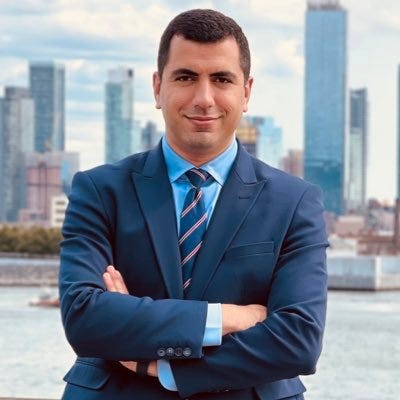
The preparatory program at Hadassah Academic College included field trips, and it was during just such a visit to the Knesset, Maswadeh told Ayelett Shani in Haaretz in 2021, that his mind became set on a journalistic career. He had enjoyed studying 20th-century history in high school, but says that when they learned about World War II in East Jerusalem, “I don’t remember any mention of the Shoah,” the Holocaust. To the extent that the subject did come up in Arab society, “from what I saw on TV and what I heard, all of it was supposed be an invention,” intended to justify the Jews coming to Palestine and expelling the Arabs.
Before you shake your head and cluck your tongue in disapproval, remember that institutional Israel, particularly during the Netanyahu years, has worked hard to prevent both Arab and Jewish citizens from exposure to Palestinian history. (And no, I’m not equating the Nakba with the Holocaust.) The fear, it seems, is that Arab Israelis will develop a Palestinian national identity, and that Jewish Israelis might become less steadfast in their Zionism if they acquire any empathy for what the Arabs of the Land of Israel suffered as a result of the state’s creation.
It may also seem absurd that Arab children in Jerusalem don’t learn Hebrew, but it’s no less absurd that most Israeli Jews have no more than a rudimentary knowledge of Arabic, if that. Maswadeh believes that Jews would only benefit from learning Arabic: “Israel is not in Europe!” he reminded Roni Kuban. “It’s surrounded by countries whose populations speak Arabic.” You might think they would be interested in understanding what their neighbors are saying and thinking. Can you imagine what it would do to shared existence here if Jews would just learn Arabic? It could lead to amazing things.”
After a year or two covering the capital for Kan, Maswadeh added responsibility for the Arab-Israeli beat to his résumé. But he was determined not to be stuck in what he calls a “ghetto.” As he told Kuban, “I believe that an Arab should be able to cover any topic, just like a Jewish journalist. And it seemed to me that that was something lacking in Israeli journalism.”
We learned the following things about Suleiman Maswadeh from his conversation with his Kan colleague: He became an Israeli citizen earlier this year; he has moved from Jerusalem to Tel Aviv, where he lives with, but is not married to, his partner. Maswadeh said it was important to him to be able to vote in Israeli elections since he pays taxes here, but my impression is that it goes beyond that, especially considering that he told his interviewer he doesn’t think he could vote for any of the existing political parties. (He’s not the only one who feels that way.) He also said that traveling abroad as a diplomatic correspondent was arduously difficult without an Israeli passport. But one gets the sense that he identifies with Israel as a state, and that that need not contradict his Palestinian identity. That need not make him a Zionist or a philo-Semite, just someone who knows how to distinguish between citizenship and national identity.
One should not be surprised, however, to learn that there are many who aren’t able to make such a distinction, and who are not happy with him and his work. Maswadeh acknowledges that he receives regular threats on his life – from both Jews and Arabs – and says that sometimes, when he’s in the field, people attack him physically.
On-screen, though, Maswadeh seems unruffled by it all. Five years after he first entered our lives, Maswadeh still has the fresh-faced, clean-cut looks he possessed back in 2019. Sometimes, he reminds me of Srulik, the character created in the 1950s by the political cartoonist Dosh (Karel Gardosh), who came for many to symbolize the innocent young Sabra of Israel’s early years. Part of the trick is that he is smiling most of the time, even when he is interviewing people who say horrible things to him. It could be the teenage girl wearing a “Kahane Was Right” sticker whom he interviewed outside Damascus Gate in 2021, during a demonstration of Lehava activists, extreme right-wing Jews who want to prevent miscegenation among Arabs and Jews, among other things. At the time, he was still a resident of Jerusalem
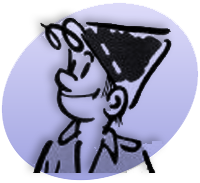
“When you hear people’s cries,” he asked the sweet-faced girl of 16 or 17, “calling for burning of an Arab village, or ‘Death to Arabs,’ does that represent you?”
Her answer: “Maybe not in that form. I say it nicely. I don’t say, I hope your village burns down, I say, leave the village and then we’re going to live there. That’s what we’re doing in the Old City, by the way. And I hope that, just as you left the Old City, excuse me for my bluntness... that eventually, slowly, people will –
Maswadeh, smiling: “I haven’t left the Old City, by the way, just so you know.”
“What? You’re still my neighbor?”
“Yes, unfortunately for you.”
“Really? Wow, wow.”
In another harmless-seeming story, available for viewing on Kan’s YouTube channel, Maswadeh visits Jerusalem’s funky Nahlaot one night shortly before Yom Kippur. There he approaches young people on their way to Selihot (prayers of expiation) services. Most are well-spoken and attractive people who appear to be in their 20s, and he asks them about the concept of “forgiveness” that is supposed to accompany the High Holy Days. Some recognize him, and tell him, without any rancor (“I know that you’re an Arab,” “I’m sure you’re a good person”), that there is no place for Arabs in the Land of Israel.
Nothing personal, of course, and on-camera, Maswadeh appears not to take any of it that way. But twice in his interview with Kuban, he mentioned how exhausted he is at the end of the day, sometimes just from speaking Hebrew non-stop. Last fall, exhaustion may have saved his life. A colleague from Kan, news editor Ayelet Arnin, had invited him to join her at the Nova rave party near Kibbutz Re’im, and he had agreed. But by Thursday evening, October 5, he recalls now, “I was just very tired. I didn’t go out of tiredness.” Arnin, 22, was murdered that Saturday by Hamas, and a guilty-stricken Maswadeh says, “I have this feeling that if I had gone, maybe I could have defended her.”
“I won’t lie that I don’t have an identity crisis,” acknowledges Maswadeh. He knows, he says, “what my component parts are, at age 28. I know that I am Arab; I know that I was born into the Palestinian experience: My family is from Hebron; I know that I live in Tel Aviv and I know that today I am an Israeli citizen. And I’m not ashamed of any of these things. For a lot of people – people on both sides -- it’s hard to swallow. But that’s who I am.”
(Last year, prior to the start of Ramadan, Maswadeh filmed a three-minute clip for Kan News about the spiritual significance of the month for Muslims, and explaining why the common Israeli misconception of it as an occasion when Muslims are encouraged to carry out religious violence ran the risk of becoming a self-fulling prophecy. The message was heavy, the presentation light as could be.)
Israel has difficulty accepting people with hybrid identities – it demands of everyone that they take sides. The profession of journalism, however, is best practiced by people who resist taking sides, or at least who allow their opinions to be determined by the facts, not by the side into which they were born. Even without death threats, a journalist dedicated to telling the truth as he sees it is going to be subject to a lot of outside demands.
Toward the end of their conversation, Kuban asked Maswadeh if he fears that all the pressures he is subject – including the pressure to appear as if he is under no pressure -- may break him, and that he will want to leave the country some day.
“Yes,” Maswadeh responded, immediately. “I’m very afraid that I won’t be able to carry the complexity of all these different identities, and I will need to leave. But I say to myself: If I leave, other people like me will leave, and then who will remain?
“I think it’s worth fighting for this state, for coexistence here. For the people who are watching us right now.
“Maybe I will eventually break. But for the time being, it hasn’t happened.”


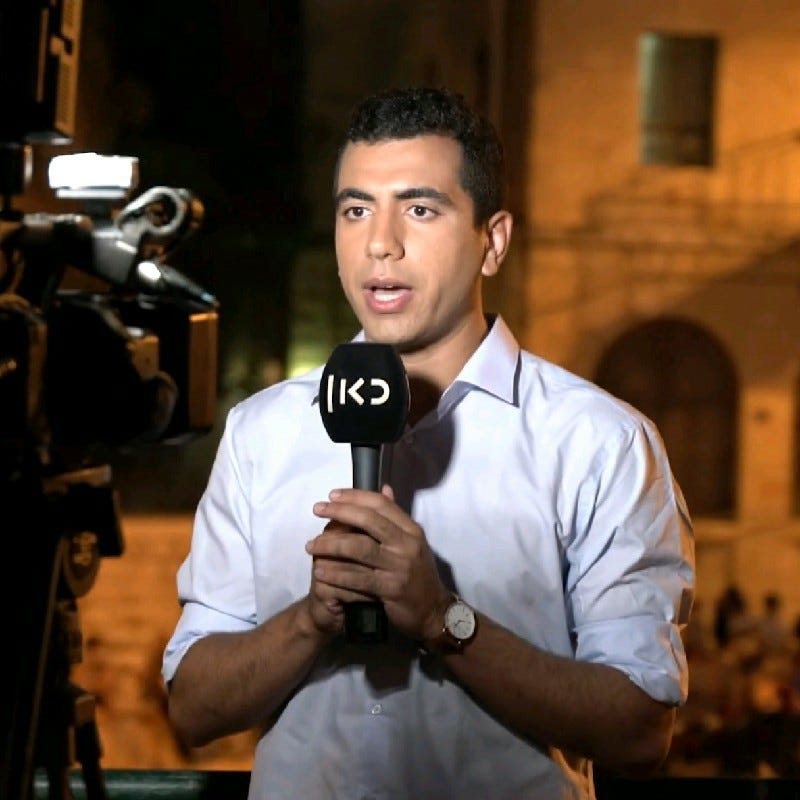
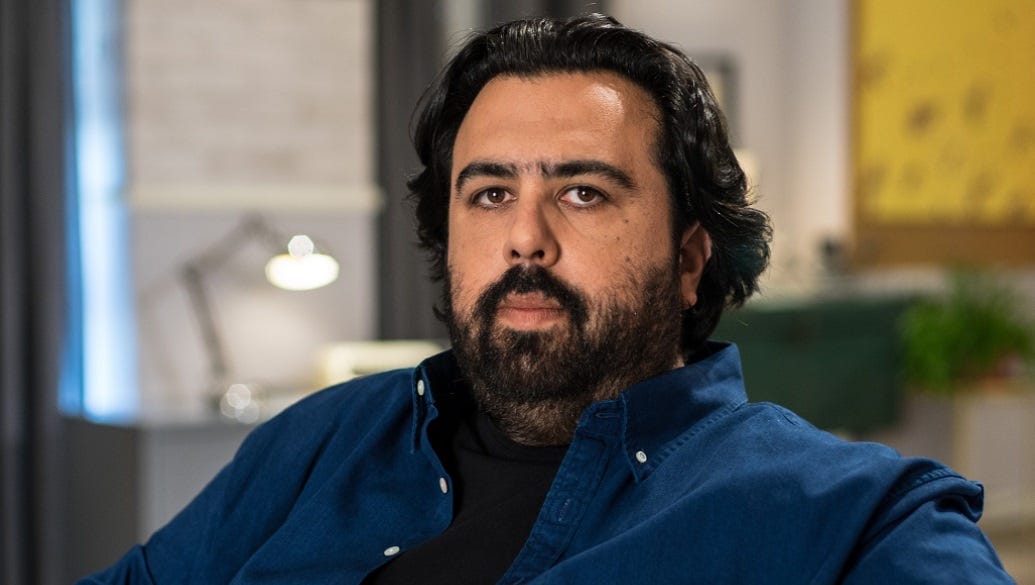
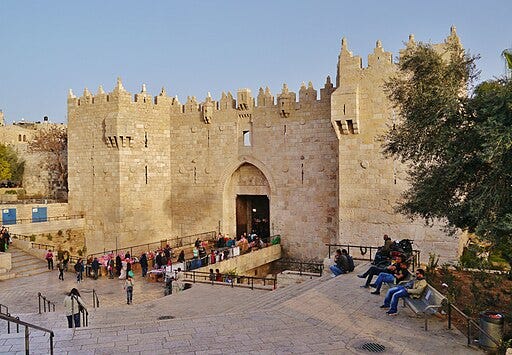
Thanks for sharing the story of Suleiman Maswadeh, a mosaic of humanity during this tender time. It gives me hope to read your insights about shared society in Israel. All we hear about stateside is more bitter and intractable political conflict with so much blame and posturing on all sides.
With gratitude for your thoughtful posts.